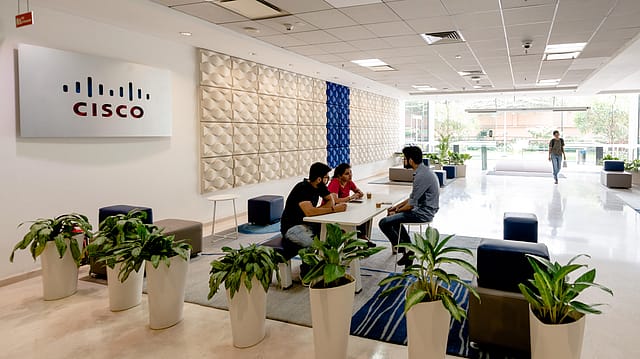Cisco declares AI infrastructure ‘non-negotiable’ as demand surges in Asia-Pacific
ADVERTISEMENT

Cisco is making a clear pitch — the AI revolution is no longer on the horizon, it’s already here, and building trusted, resilient infrastructure is non-negotiable.
In a recent media briefing, Jeetu Patel, president and chief product officer, and Dave West, SVP & president for Cisco in the Asia Pacific, Japan & Greater China (APJC) region, laid out the company’s strategic focus for what they call the ‘agentic era of AI’ — a new phase where autonomous agents will perform tasks for humans, reshaping both infrastructure and enterprise expectations.
“We are all probably witnessing one of the most interesting technology shifts in human history,” said Patel. “We’re moving from chatbots answering questions to agents conducting jobs fully autonomously. This is a phenomenal shift.”
“Agentic AI is being used across Ford’s business, from design to engineering to manufacturing and for customer support,” said Patrick Milligan, chief information security officer, Ford Motor Company. He added, “As we build, deploy, and manage sophisticated AI capabilities at scale, Cisco’s networking and security solutions are an important part of the overall technology infrastructure.”
From chatbots to digital workers
Patel believes the AI market is not overhyped — if anything, it’s underhyped when it comes to the kinds of original insights AI will unlock. “There are tens of billions of agents that are going to augment human capacity. With 8 billion humans on the planet, it will feel like we have the throughput capacity of 80 billion humans,” he said.
But this scale demands a complete reimagination of infrastructure — from compute and storage to networking and security. “AI is power-bound, compute-constrained, network-constrained, data-constrained, and security-constrained. That’s where Cisco comes in,” he added, positioning the company as a backbone provider in the new AI economy.
West echoed that view from an Asia-centric lens. “Technology is at the forefront of decisions companies are making to be more competitive, to drive greater operational efficiencies. Customers are looking to modernise infrastructures and build proactive, self-healing, autonomous systems,” he said.
In APJC specifically, he noted a shift from just experimenting with AI training to actively deploying inferencing. “Enterprises are building real use cases. It’s no longer just an IT or security operations conversation — AI has become a board-level agenda,” West added.
One of the most important pivots in Cisco’s narrative is around security. Where once productivity was seen in tension with security, Patel believes the tables have turned.
“Safety and security are prerequisites for AI adoption. If people don’t trust AI, they’re not going to use it,” he said. “We’ve flipped from having to trade off productivity for security to needing security to enable productivity.”
According to the Cisco IT Networking Leader Survey, 97% of businesses believe they need to upgrade their networks to make AI and IoT initiatives successful, and the stakes are high: a single severe outage can inflict nearly $160 billion in losses globally. Faced with these challenges, IT teams need a new approach to scale operations, reduce downtime, and unlock new levels of efficiency and innovation.
To meet that demand, Cisco is embedding security across the full stack — from data centre to endpoints — and using its acquisition of Splunk to drive smarter telemetry. “We can now correlate telemetry from networking, applications, and security to drastically reduce detection, investigation and response times,” Patel said. That’s crucial, especially when AI workloads rely on extremely efficient GPU use. “Idle time on a GPU is like throwing away money.”
India in focus, infrastructure expansion ahead
With AI workloads demanding massive backend processing, Cisco is betting on a surge in data centre buildouts globally — and India is squarely on its radar.
“We’ve seen tremendous investment in data centre capacity, including in the Middle East, and we’re coming to India soon,” Patel revealed. Cisco plans to serve as the networking provider for “AI-ready” data centres globally.
The company is also focusing on “future-proofing” workplaces — whether it’s a campus, branch office, or even a car — through robust connectivity, collaboration tools, and infrastructure monitoring.
On the other hand, Cisco is seeking to bring structure to the chaos. “We are building predictable applications on top of non-deterministic, unpredictable models,” Patel said.
That balance — of harnessing AI’s power while making it secure, efficient and trustworthy — is what Cisco sees as its differentiator. In Q3 FY25, Cisco notably surpassed its annual target of $1 billion in AI infrastructure orders from hyperscalers a full quarter ahead of schedule.
“If there’s one thing you take away,” Patel said, “it’s that Cisco is the infrastructure provider that’s going to help you transition to the agentic era — whether you’re a hyperscaler or a mid-sized enterprise.”